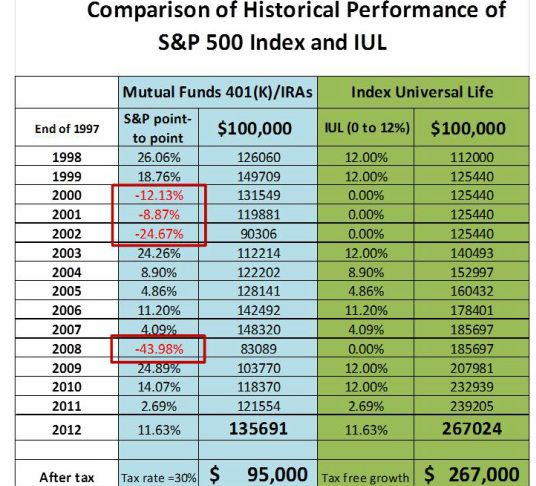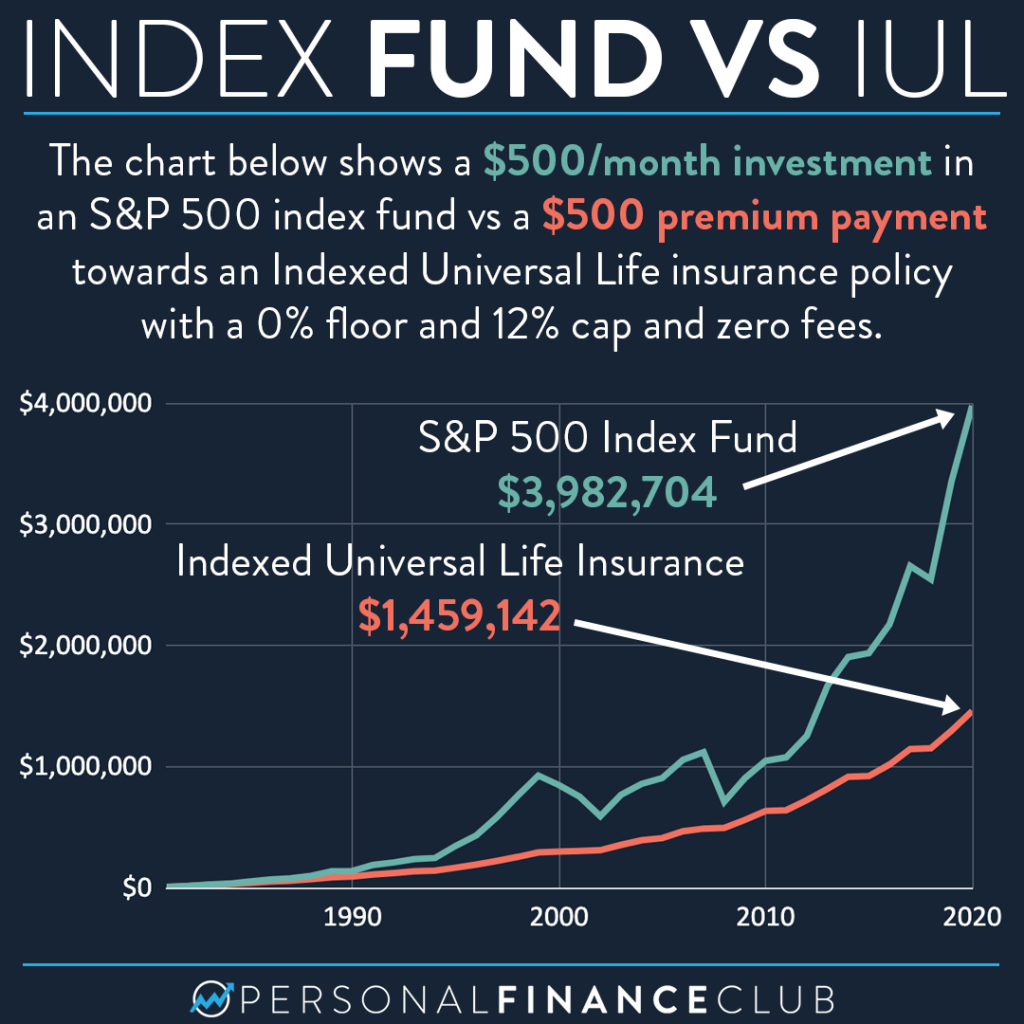All Categories
Featured
Table of Contents
Indexed Universal Life (IUL) insurance policy is a sort of permanent life insurance coverage plan that combines the features of traditional universal life insurance coverage with the possibility for cash money worth development connected to the performance of a stock exchange index, such as the S&P 500 (Flexible premium Indexed Universal Life). Like other kinds of irreversible life insurance policy, IUL offers a fatality benefit that pays out to the beneficiaries when the insured passes away
Money value build-up: A part of the costs repayments enters into a cash money value account, which gains rate of interest over time. This cash money worth can be accessed or obtained versus during the insurance policy holder's life time. Indexing alternative: IUL plans use the possibility for cash money worth growth based on the performance of a stock market index.
Iul Death Benefit
As with all life insurance policy products, there is also a collection of threats that policyholders ought to know prior to considering this kind of plan: Market danger: Among the primary threats related to IUL is market danger. Because the cash money value growth is connected to the performance of a stock exchange index, if the index chokes up, the cash worth may not expand as anticipated.

Adequate liquidity: Policyholders need to have a secure monetary situation and be comfy with the exceptional repayment requirements of the IUL policy. IUL allows for versatile costs repayments within certain restrictions, however it's necessary to keep the policy to guarantee it achieves its desired objectives. Rate of interest in life insurance coverage: Individuals who need life insurance protection and a rate of interest in cash money value development might discover IUL appealing.
Prospects for IUL should have the ability to recognize the mechanics of the plan. IUL might not be the most effective option for individuals with a high resistance for market risk, those that prioritize low-cost investments, or those with even more instant economic demands. Consulting with a certified financial expert who can offer personalized guidance is vital prior to thinking about an IUL plan.
All registrants will receive a calendar invitation and link to sign up with the webinar by means of Zoom. Can not make it live? Register anyway and we'll send you a recording of the presentation the next day.
What does Iul Vs Whole Life cover?
You can underpay or miss premiums, plus you might have the ability to readjust your survivor benefit. What makes IUL different is the means the cash money value is invested. When you secure an indexed universal life insurance policy policy, the insurance policy company provides a number of alternatives to choose a minimum of one index to make use of for all or part of the cash money worth account segment of your policy and your survivor benefit.
Versatile premiums, and a death benefit that may also be versatile. Cash money worth, along with prospective development of that value through an equity index account. IUL for retirement income. A choice to allocate part of the money worth to a fixed interest alternative. Minimum rate of interest guarantees ("floorings"), yet there may also be a cap on gains, commonly around 8%-12%. Built up cash money value can be used to reduced or possibly cover costs without subtracting from your fatality advantage.
Policyholders can determine the portion assigned to the fixed and indexed accounts. The value of the picked index is videotaped at the start of the month and compared with the value at the end of the month. If the index boosts throughout the month, passion is included to the cash money worth.
The 6% is multiplied by the cash money value. The resulting interest is included in the money value. Some plans calculate the index obtains as the amount of the modifications through, while other policies take approximately the everyday gains for a month. No interest is credited to the money account if the index goes down instead of up.
Iul Death Benefit
The rate is established by the insurer and can be anywhere from 25% to greater than 100%. (The insurance firm can likewise change the participate rate over the lifetime of the plan.) For instance, if the gain is 6%, the participation rate is 50%, and the existing cash money value total is $10,000, $300 is added to the cash money value (6% x 50% x $10,000 = $300).
There are a number of pros and disadvantages to take into consideration before purchasing an IUL policy.: Just like common universal life insurance policy, the insurance policy holder can enhance their costs or reduced them in times of hardship.: Amounts attributed to the cash money value grow tax-deferred. The money value can pay the insurance coverage costs, allowing the policyholder to reduce or stop making out-of-pocket premium repayments.
What is a simple explanation of Indexed Universal Life Tax Benefits?
Many IUL plans have a later maturation day than other kinds of universal life policies, with some ending when the insured reaches age 121 or even more. If the insured is still to life back then, plans pay the death benefit (but not typically the cash worth) and the earnings might be taxable.

: Smaller sized policy stated value don't use much benefit over normal UL insurance policy policies.: If the index decreases, no passion is attributed to the cash worth. (Some plans use a reduced ensured rate over a longer duration.) Other investment cars use market indexes as a criteria for performance.
With IUL, the goal is to benefit from higher movements in the index.: Due to the fact that the insurance provider just acquires alternatives in an index, you're not directly purchased stocks, so you do not profit when firms pay rewards to shareholders.: Insurers fee costs for handling your money, which can drain pipes cash money worth.
Who has the best customer service for Indexed Universal Life Vs Term Life?

For most individuals, no, IUL isn't much better than a 401(k) - Indexed Universal Life account value in terms of conserving for retirement. Many IULs are best for high-net-worth individuals searching for means to reduce their gross income or those who have actually maxed out their various other retirement choices. For everybody else, a 401(k) is a much better financial investment car due to the fact that it does not bring the high fees and premiums of an IUL, plus there is no cap on the amount you may gain (unlike with an IUL policy)
While you might not lose any kind of money in the account if the index decreases, you won't earn interest. If the marketplace transforms favorable, the earnings on your IUL will not be as high as a regular investment account. The high expense of premiums and fees makes IULs costly and considerably less economical than term life.
Indexed global life (IUL) insurance uses cash value plus a survivor benefit. The cash in the cash value account can gain rate of interest with tracking an equity index, and with some usually assigned to a fixed-rate account. Indexed universal life policies cap just how much cash you can accumulate (usually at much less than 100%) and they are based on a possibly unpredictable equity index.
What is a simple explanation of Flexible Premium Iul?
A 401(k) is a much better choice for that purpose since it doesn't bring the high costs and costs of an IUL policy, plus there is no cap on the amount you may earn when spent. The majority of IUL plans are best for high-net-worth people looking for to reduce their gross income. Investopedia does not give tax, investment, or financial services and suggestions.
If you're considering purchasing an indexed global life plan, first talk to an economic expert that can discuss the nuances and offer you an exact image of the actual capacity of an IUL policy. Ensure you recognize exactly how the insurance provider will determine your rates of interest, revenues cap, and costs that could be assessed.
Latest Posts
Why is Iul Vs Whole Life important?
What is Iul?
Who has the best customer service for Indexed Universal Life Vs Term Life?